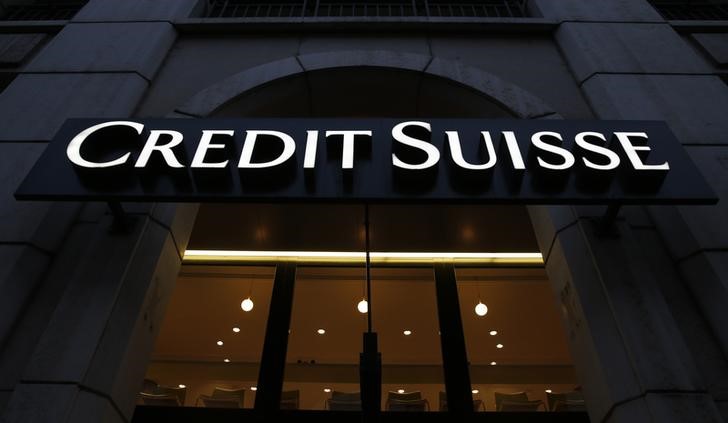By Anjuli Davies and Jamie McGeever
LONDON (Reuters) - Credit Suisse's announcement on Wednesday that it will lay off thousands more employees from its trading operations shows how much ground Europe's big banks are losing to U.S. rivals in financial market trading.
The 2,000 job cuts at the Swiss bank follow 4,000 announced as recently as January, and come at the end of what Chief Executive Tidjane Thiam said was one of the worst first quarters for trading on record.
Banks have been on a massive cost-cutting drive since the 2008 global financial crisis as tighter regulations have limited their ability, and willingness, to act as market makers in fixed income markets.
But U.S. banks have adapted to the new environment faster than European rivals, both because regulators forced them to boost capital levels earlier and thanks to being in the world's largest and most lucrative market for fees.
Most of the attrition at European banks has been in fixed income, currencies and commodities (FICC) trading, where revenue has plunged and U.S. banks have taken the lead.
In 2007, revenue from FICC at the eight biggest European banks was $48 billion, ahead of the $38 billion made by the five biggest U.S. banks, according to data analytics firm Tricumen.
Last year, European banks grossed $26 billion from FICC while the U.S. banks made $43 billion, the data showed, meaning Europe's 26 percent advantage has swung to a 40 percent deficit.
The new regulations make trading in fixed income, currencies and commodities more expensive, forcing some banks, especially those in Europe, to exit certain business lines entirely.
"The first quarter has been brutal, and has revealed the extent to which the fixed cost base – IT, infrastructure, salaries - absorbs a large portion of the much lower revenues," Atlantic Equities analyst Chris Wheeler said.
"The biggest culprit remains FICC, which continues to also be a very capital intensive business," he said.
Tricumen data shows that 13 of the biggest global banks employed 18,020 front office staff in fixed income, currencies and commodities trading operations in the first quarter, a fall of 34 percent from 27,320 in the same period of 2010.
Tricumen estimates up to 600 of the 2,000 Credit Suisse (SIX:CSGN) trading job cuts announced on Wednesday will be in FICC. Once they are factored in, the slump in FICC sales and trading staff over the last six years comes to more than 36 percent.
READY TO POUNCE
Advances in technology over the past decade have also led to a dramatic increase in automated trading, which has come at the expense of the human trader. Most banks are focused more on expanding and improving trading technology, hiring engineers and product managers rather than traders.
In currency markets, algorithms account for about 70 percent of trading on the EBS platform, up from some 30 percent in 2007, according to the Bank for International Settlements.
"There's still a role for the trader but it's much diminished," said the head of rates at one European bank.
But one man's pain could be another's gain, particularly for some Wall Street banks that have been stealing a march on their European rivals for several years.
Goldman Sachs analyst this week described the first quarter as "extremely challenging" for European investment banks, with activity slow across all major revenue areas, and forecast a decline of about 25 percent in revenue from a year earlier.
Deutsche Bank Chief Executive John Cryan has already said that Germany's biggest lender, traditionally a market trading powerhouse, will probably not make a profit in 2016.
The woes of Deutsche Bank (DE:DBKGn) and other European banks mean U.S. players could pick up market share, though they will be selective about where they choose to compete.

"Some of the large U.S. banks are ready to pounce. However, it's not straight forward and it's not a zero-sum game. Many of the RWA (risk weighted assets) being shed by the European banks are in unprofitable businesses where the U.S. banks have no desire to bulk up," Wheeler at Atlantic Equities said.